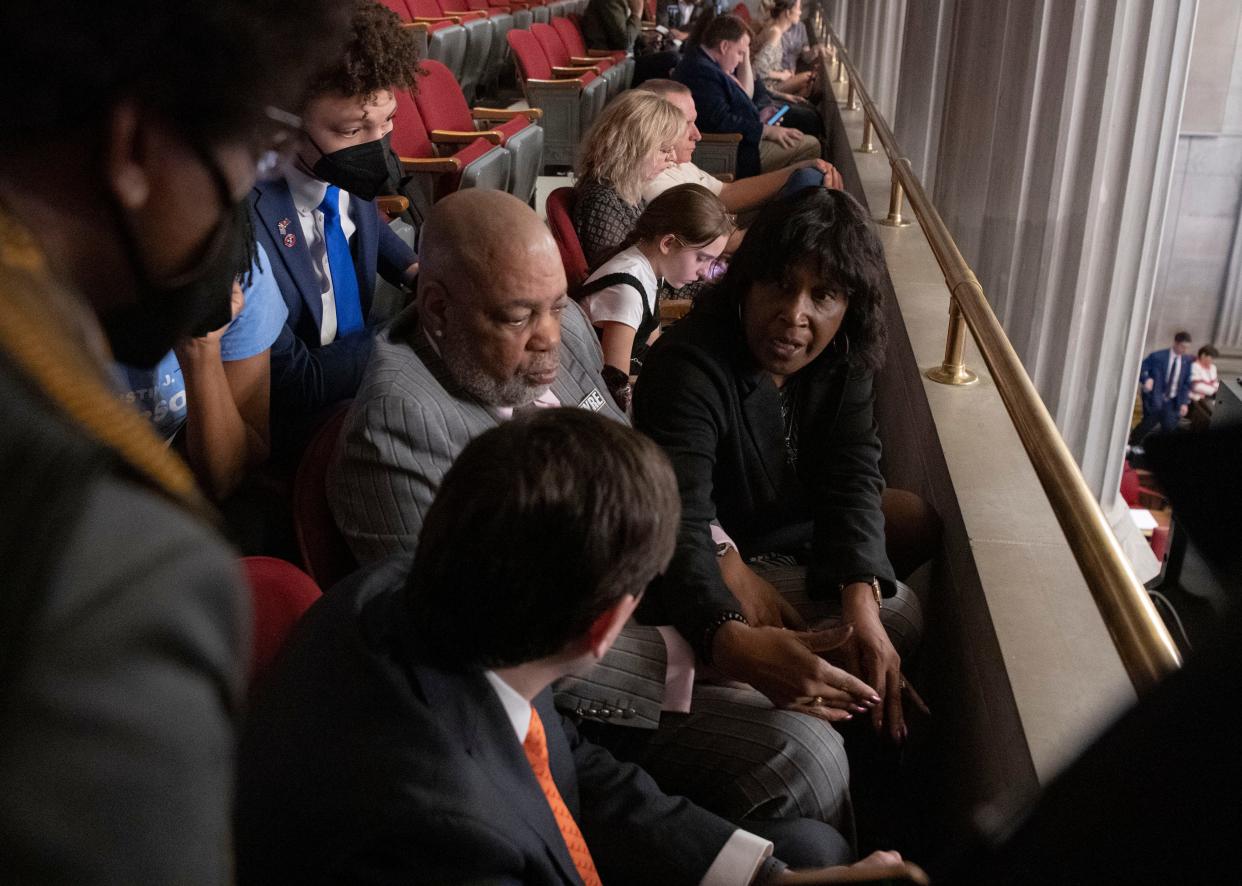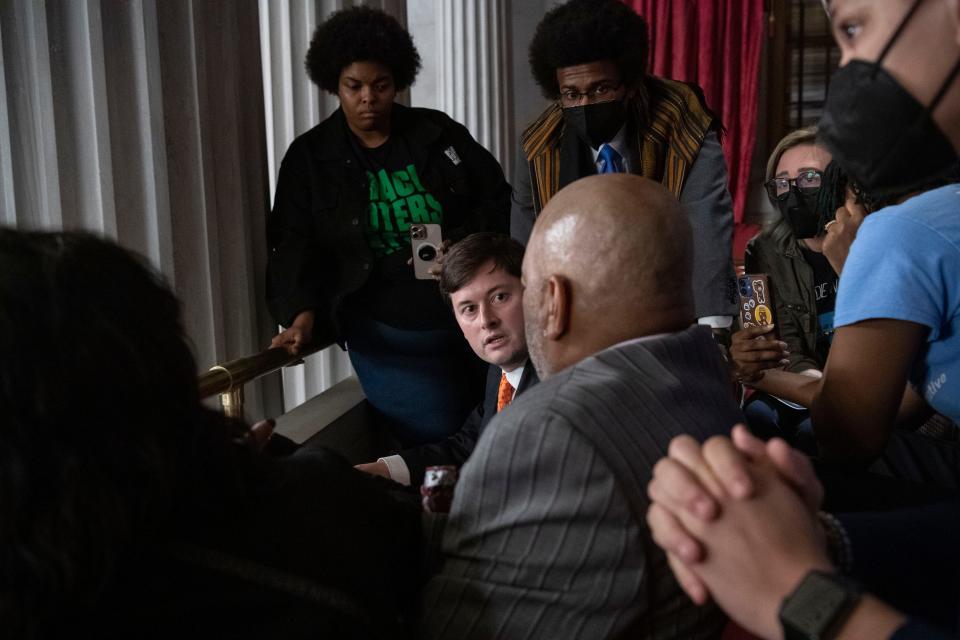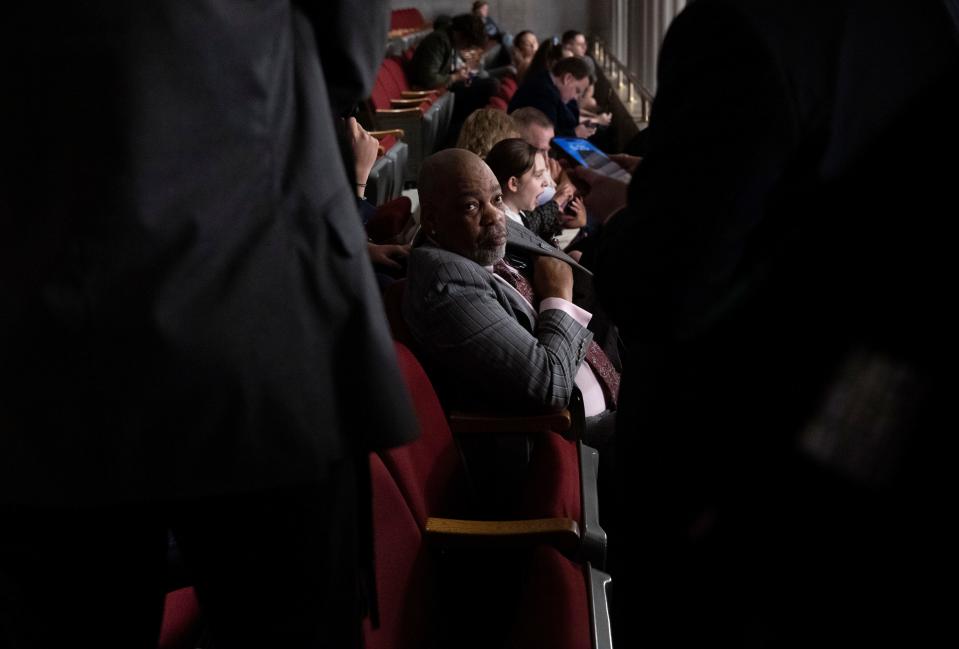Tennessee Senate sends bill banning local police traffic stop reform to governor's desk

The Tennessee Senate Thursday morning passed a bill blocking local governments from passing police reform on traffic stop policies, sending the bill to Gov. Bill Lee's desk to be signed into law.
The bill passed a floor vote in the House on March 7 over the objections of Tyre Nichols' parents, who said they felt misled by the bill's House sponsor Rep. John Gillespie, a Republican from Memphis, about when the House would vote on the bill. Gillespie denied intentionally misleading the family, saying it was a "miscommunication."
They were not present for that House vote but were in Nashville Thursday and spoke with legislators prior to the vote.
The bill passed with 26 "yes" votes and six "no" votes along party lines, with all Memphis and Nashville Democrats voting against it.
"We've come so far in this country when it comes to racial equity, and trying to improve the relationships between police and citizens," Sen. London Lamar, a Memphis Democrat, said on the floor Thursday morning. "If you talk to me, I want to solve violent crime in Memphis more than anybody else, alongside my colleagues from my county. We love Memphis, and we love your counties, too. But the fact of the matter is this does not reduce crime. Every piece of data you can look at will show this does not reduce crime. It is extreme government overreach and a slap in the face to the Wells family and to all of those in this world who were impacted by seeing Tyre Nichols brutally murdered on camera for a routine traffic stop."

Calhoun Republican Sen. Adam Lowe, in a rebuttal to Democrats' concerns, cited two cases where people were pulled over for having a tail light out and later charged with murder and child rape.
"In a different part of the state, what if that city council had passed an ordinance saying they couldn't have pulled him over?" Lowe said. "I'm trying to see how the misjudgment and abuse of some officers in Shelby County and in Memphis should reflect and restrict the good officers that exist in McMinn County, Tennessee, or Bradley County, Tennessee, who use those tactics of stops and are continuing to stop things like child trafficking."
Memphis Republican Sen. Brent Taylor, the bill's Senate sponsor, said in a press release at the bill's filing that traffic stops are a tool for police that "have resulted in major arrests and the apprehension of violent criminals for years." In remarks on the Senate floor Thursday, Taylor cited serial killer Ted Bundy and Oklahoma City bomber Timothy McVeigh being arrested during traffic stops. Bundy was stopped for speeding and McVeigh was stopped for not having a license plate on his car. Neither stop would have been prohibited under Memphis' ordinance.
More: TN appeals court questions role of local district attorneys, how much power can be stripped
Research done by a local advocacy group found that pretextual stops in Memphis and Shelby County, despite happening more frequently after Nichols' death, resulted in few felony arrests.
Data presented Wednesday evening at the National Civil Rights Museum, collected by the Justice Innovation Lab and analyzed by the Vera Institute of Justice, showed that for every 100 traffic stops conducted in Memphis, less than one is associated with a gun charge.
Sen. Jeff Yarbro, a Democrat from Nashville, said the bill effectively overturned the steps taken by the City of Memphis to try to avoid a future incident like what happened with Nichols.
"This young man was killed under the authority of the State of Tennessee," Yarbro said. "They claimed the legal right to pretextually stop him and that's when he was killed. That's in our name. And it's, frankly, in the City of Memphis' name, and they chose to do something about it with their ordinances. They didn't tell anybody to stop enforcing the laws of the state. They said, 'We passed this ordinance and we don't want this ordinance to lead to some kid getting pulled over for having a broken tail light, or a two-week expired tag and getting in an altercation or dying.' Why would we stop a local government from responding to that kind of tragedy?"
Taylor, after the vote, said the Wells family on Thursday asked him to consider delaying the bill.
"I just thought it was in the best interest of everybody involved — the Wells family, the community back home — to go ahead and have closure with this so that everybody can move forward from here," Taylor said. "Because a delay would not have changed the outcome of this vote."
Lamar criticized Taylor and the effort to preempt Memphis policy after the Senate vote. Lamar said the nation "watched" Memphis police hold the officers involved in Nichols' death accountable, and watched the city put in place a policy that other governing bodies across the country followed.
"Today, they watched the Tennessee legislature undo all the progress we have made. It is disingenuous, it is disrespectful, and everybody who voted for that piece of legislation should be ashamed," Lamar said.
The bill, if signed into law by Lee, would directly nullify an ordinance passed by the Memphis City Council in the wake of Nichols being fatally beaten by now-former officers with the Memphis Police Department. That ordinance prevents police from conducting low-level traffic stops, often called "pretextual traffic stops."
Per the ordinance, Memphis police cannot pull people over for only secondary violations. Those include having registration that expired under 60 days prior; if a temporary tag is in the incorrect place, but clearly visible; if a license plate is not securely fastened to a vehicle, but is clearly visible; if a single brake light, headlight or running light is broken; and if the car is missing, or has a loosely fastened bumper.

The ordinance allows police to cite motorists for a secondary violation during a traffic stop if that traffic stop was initiated due to a primary violation, such as speeding, reckless driving or running a red light.
The ordinance, named in honor of Nichols, drew support from activists and had wide support from the Memphis City Council.
The House and Senate bill to nullify that ordinance, and similar ordinances, spurred local Memphis leaders to write letters opposing the bill, including the Memphis City Council Chairman JB Smiley Jr. and Memphis Mayor Paul Young.
More: Tyre Nichols state criminal trial put on hold until federal trial finishes, attorney says
Lucas Finton is a criminal justice reporter with The Commercial Appeal. He can be reached at [email protected], or (901) 208-3922 and followed on X, formerly known as Twitter, @LucasFinton.
This article originally appeared on Memphis Commercial Appeal: Tennessee Senate passes bill banning local police traffic stop reform
